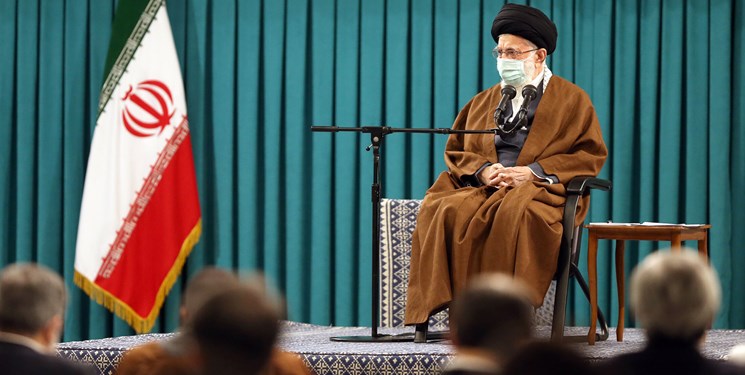Leader Warns of Enemies’ Attempts to Influence Iran’s Public Opinion
Supreme Leader of the Islamic Ummah and Oppressed Imam Ayatollah Seyed Ali Khamenei warned that enemies are using huge media and propaganda possibilities to influence the minds and thoughts of the Iranian people.

Addressing a group of eulogists on the birth anniversary of Hazrat Fatima Zahra (SA), the beloved daughter of Prophet Muhammad (Peace upon Him), in Tehran on Sunday, the Leader touched on the vast campaign of the enemies to upend the thoughts of the Iranian people and destroy their faith and beliefs through the mass media and using thousands of art and media experts and huge financial and security support, against which “the most important area of jihad is the field of explanation and enlightenment”.
“In the face of this evil move, hay’ats must ask themselves where they stand on the front of truth and falsehood, and the confrontation between the narrative of falsehood and truth, and how they expand the main ideals and foundations of the revolution,” Ayatollah Khamenei said.
Hay’ats are religious foundations which hold mourning or eulogy ceremonies for Prophet Muhammad (Peace upon Him) and his infallible Household known as Ahl al-Bayt.
Ayatollah Khamenei described hay’ats as “the center of the great jihad of enlightenment”, saying they should be a place for providing convincing and correct answers to the current questions of the society, especially the young generation.
“The axis of the formation of hay’ats as a social unit has been the friendship of the Ahl al-Bayt and keeping alive the way and school of the Imams, which has been formed since the time of those nobles.”
The Leader also outlined various aspects of the struggle against the enemies of Islam enshrined in the principle of jihad, and said, “Jihad means striving to target the enemy, and the field of jihad must be correctly identified at all times.”
Ayatollah Khamenei touched on various fields of jihad in different periods such as military jihad, scientific jihad and jihad of social service.
“For instance, social service to the people in a situation where the enemy is trying to put them against the Islamic system by creating economic pressure is valuable jihad.”
The Leader also touched on patterns inspired by the life and thoughts of Hazrat Fatima Zahra (SA) in the Iranian society, citing sincere services meted out to the needy and those hit by floods and other natural disasters as well as scientific services of Iran’s nuclear experts assassinated in recent years as examples.
Ayatollah Khamenei also cited services provided to the public without pay during the COVID-19 pandemic as another example.
“Hazrat Fatima Zahra must be a role model in all aspects, specially social and revolutionary movements,” he said.
In relevant remarks in September, Ayatollah Khamenei underscored the need for the Iranian students to foil enemy’s attempts to launch propaganda campaign against the country, by illustrating truth.
“You, dear students, who are the fruits of the nation’s heart and the true hope of the country, light up your surroundings like a beacon and dispel ambiguities by paying attention to the issue of illustrating truths,” Ayatollah Khamenei said , addressing a group of University of Tehran students via a video conference during a mourning ceremony held on the occasion of Arbaeen, the 40th day after the martyrdom anniversary of Imam Hussein (AS), the third Imam of the Shiites.
He said while the day of Ashura, on which Imam Hussein was martyred, was the peak of Imam Hussein’s struggle and self-sacrifice, and the ensuing 40-day period was the peak of the struggle to illustrate and uncover the truth, made possible by the Imam’s daughter, son and others who kept the events of Karbala alive.
The Leader touched on the opportunities, which cyberspace and social media networks offer for enlightenment and clarification of the ambiguities.
“However, the definite principle in the jihad of explaining and telling the truth is to use moral methods and express issues with logic, equanimity and complete rationality, taking human sentiments into account, and avoid insult, slander, lies and deception in the face of the public opinion,” he said.







